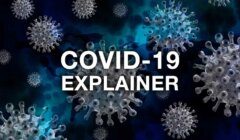Coronavirus / For ‘herd immunity’ to be successful the process needs surveillance
Virologist Deborah Briggs, who lives in Burra, agrees with the World Health Organisation’s (WHO) view that not enough is known about Covid-19 to determine what level of ‘herd immunity’ is required to prevent the spread of the virus. Here she explains why adequate testing is essential and what everybody can do to protect themselves and others.
Covid-19 is a recently recognised, rapidly spreading infection caused by a virus identified as a member of a large family of viruses known as coronaviruses. Coronaviruses cause illness ranging from common cold type of symptoms to severe respiratory illnesses.
As we know, the current global pandemic caused by Covid-19 has reached Shetland. The information that is detailed in this article is a very brief description of the theory of ‘herd immunity’ and the role of surveillance as well as an outline of the most recent scientific data on prevention of Covid-19. More data are posted on reputable websites online.
It is most important to clearly understand the scientific information about Covid-19 and how it is spread, as well as to understand the epidemiology of the disease in order to protect ourselves, our loved ones and our community.
The first tenet of controlling any disease is adequate surveillance.
Surveillance means conducting adequate testing procedures. Without surveillance, it is impossible to:
- Understand the spread of disease within a community and implement adequate and timely control measures;
- Determine and evaluate if adequate control measures are being, or have been implemented;
- Identify the number/percentage of infected individuals in a community and also to determine when the epidemic is over and thus when life can get back to ‘normal’; and
- Evaluate the information/data collected and ‘lessons learned’ for future use in the spread of diseases in the community.
Herd immunity roughly translated means that a specific percentage of susceptible individuals within a community are ‘protected’ against disease. Generally, this happens through organised vaccination programmes that enable a high percentage of the population to be vaccinated, thus producing antibody against a specific virus or bacteria and thus they are immune from infection.
Become a member of Shetland News
At this point in time, there is no vaccine against Covid-19. This means that herd immunity against Covid-19 can only be achieved through exposure to the virus and the exposed individual(s) producing antibody against Covid-19 virus.
It is critically important to also remember that as of today, there are no scientific data indicating what percentage of individuals will need to have been exposed to the virus and produce antibody in order to reach the level of herd immunity required to prevent continued spread of the disease.
Without surveillance, collection and analyses of data, it will never be possible to identify, clarify and achieve ‘herd immunity’.
The following information include a brief review of the scientific facts that we are currently aware of regarding the prevention and spread of Covid-19:
How is it spread?
The main means of transmission is from ‘person-to-person’. This usually happens when someone coughs or sneezes and produces tiny respiratory droplets that are inhaled and thus infect a susceptible person through their mouth and/or nose.
There have been a few reports indicating that the virus may spread before the onset of clinical symptoms. However, this is not the main method of spread.
What about contaminated surfaces, or objects?
Current information indicates that the virus can remain viable on surfaces for hours to days depending on the surface material. This means that Covid-19 can potentially be spread when a susceptible person touches a contaminated object or surface and then touches his/her mouth, nose or eyes. However, this is not the main method of spread.
Protecting yourself
There is no vaccine. Thus, the most efficient method to prevent infection is to avoid being exposed.
Older adults, especially with underlying chronic medical conditions, are especially at risk of serious illness if infected.
Clean your hands often and correctly. There are many good videos online from reputable sources showing the correct method of hand washing. Wash all parts of your hands for at least 20 seconds with soap and water. When you have been in a public place, come in from outside, after you blow your nose, cough etc., be sure and wash your hands.
Hand sanitizers that have 60 per cent alcohol are a substitute if soap and water are not available.
Avoid touching your face, eyes, mouth, nose without washing your hands beforehand.
Avoid close contact with sick people if possible.
Put distance between you and others if Covid-19 is spreading in the community. The recommended distance is about two meters.
Protecting others
Stay at home if you are sick.
Cover your mouth and nose with a tissue when you cough or sneeze or use the inside of your elbow, not your hand. Bin the tissue afterwards and immediately wash your hands.
Facemasks are not necessary if you are healthy but should be worn if you are ill. Wear a facemask if you are caring for a sick person and they cannot wear a mask.
Be cautious about removing or putting on a facemask as it is easy to contaminate your hands by touching the front of the mask. Always wash your hands before and after putting on a facemask.
Clean and disinfect frequently. For example: disinfect frequently used surfaces such as tables, doorknobs, light switches, countertops, handles, desks, phones, keypads toilets, sinks, faucets etc.
Deborah Briggs is the course coordinator for the graduate course on Global Public Health in the College of Veterinary Medicine at Kansas State University, and currently lives in Bridge End.
Become a member of Shetland News
Shetland News is asking its readers to consider paying for membership to get additional perks:
- Removal of third-party ads;
- Bookmark posts to read later;
- Exclusive curated weekly newsletter;
- Hide membership messages;
- Comments open for discussion.
If you appreciate what we do and feel strongly about impartial local journalism, then please become a member of Shetland News by either making a single payment, or setting up a monthly, quarterly or yearly subscription.







































































